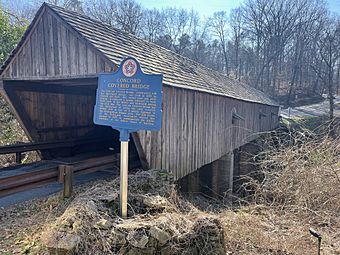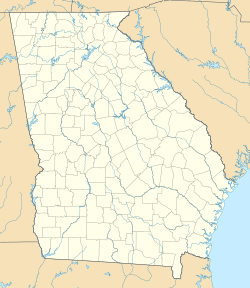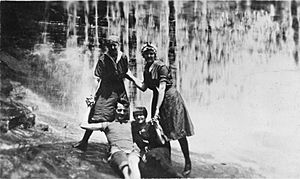Ruff's Mill and Concord Covered Bridge facts for kids
Quick facts for kids |
|
|
Ruff's Mill and Concord Covered Bridge
|
|
 |
|
| Location | 10 Concord Rd., SW, Smyrna, Georgia |
|---|---|
| Area | 3.5 acres (1.4 ha) |
| Built | c.1864 |
| Architect | Ruff, Martin L., Jr.; Daniell, Robert |
| Architectural style | Plantation Plain |
| NRHP reference No. | 80001001 |
| Added to NRHP | November 24, 1980 |
Ruff's Mill and Concord Covered Bridge are important historical sites in Smyrna, Georgia. They were added to the National Register of Historic Places in 1980. This means they are special places worth protecting because of their history.
The site includes an old mill building, the house where the miller lived, and a unique covered bridge. These buildings show what small, water-powered mills were like in the southern United States in the 1800s.
Contents
Discovering Ruff's Mill History
Ruff's Mill and the Miller's House are very old, built in the 1840s and 1850s. The land where they stand was once part of Cherokee territory. It became available to settlers through the Georgia Gold and Land Lottery in 1832.
Martin L. Ruff was an important early settler in Cobb County. His family ran the mill for many years. This mill ground wheat and corn into flour.
The Battle at Ruff's Mill
During the American Civil War, a big battle happened here on July 4, 1864. This was part of the Atlanta Campaign. Union soldiers fought Confederate soldiers in what was called the Battle at Ruff's Mill.
The Union forces won this battle. It was the only time during the Atlanta Campaign that Union soldiers successfully broke through a Confederate defense line. The mill building still has bullet marks on its stone walls from this fight. The miller's house was saved from being burned down. It was used as a hospital for wounded soldiers.
The Miller's House Design
The Miller's House has a simple but special design. It is tall and narrow, a style called "Plantation Plain." Over the years, the house has been changed to fit the people living there. But its outside still looks much like it did when it was first built.
The gardens around the house were designed in the 1930s. A famous landscape architect named William C. Pauley created them. He also designed Hurt Park in Atlanta.
Exploring Concord Covered Bridge
The Concord Covered Bridge is a one-lane bridge that crosses Nickajack Creek. It was first built in 1872. For over 150 years, this bridge has been used continuously. It has been rebuilt, fixed, and made stronger many times. This helps it handle modern cars.
This covered bridge on Concord Road is the only one left in Cobb County. It is also one of only 16 covered bridges remaining in all of Georgia. The bridge is about 133 feet long, 16 feet wide, and 13 feet high. It has a low entry clearance of seven feet. Sometimes, drivers of tall vehicles hit the top of the bridge because of this.
Building the Bridge
Two bridges were built in the same spot. Martin L. Ruff, Sr., who owned the land, was involved in building the first bridge. In 1848, he worked with his neighbors, Robert Daniell and State Senator John Gann. They built a flat-decked bridge with stone supports. These stone supports might have been used again when the covered bridge was built 24 years later.
Even though the Concord Covered Bridge has been made much stronger over the years, it still looks like it did in the 1800s. It has a heavy wooden floor, sides made of vertical wood planks, and a roof made of cedar shakes.
Nickajack Dam Remnants
If you look upstream from the bridge, you can see what's left of the Nickajack Dam. This dam helped power the Grist Mill. Water from the dam flowed through a channel under Concord Road to the mill. The water dropped over 20 feet from the dam to the mill. This short, powerful drop gave the mill a strong source of water power.
 | Misty Copeland |
 | Raven Wilkinson |
 | Debra Austin |
 | Aesha Ash |





